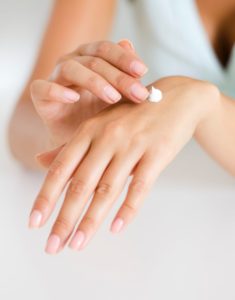What Happens To Animals After They Are Tested On In The Cosmetic Industry
Fauna testing sounds like an sometime style of making cosmetics, but it'due south more common than you might think! Not every visitor has removed this from their development process, and not every land has made it illegal – information technology's notwithstanding very legal in many places, including Canada. The skincare products on our shelves aren't guaranteed to be cruelty-free.
Even with the development of prophylactic, inexpensive alternatives, companies still use animal testing as a mode to blitz the procedure. Almost companies that still employ animal testing exercise so for another of import reason: to cover their backs.
How Animal Testing Works
Animate being testing provides companies with data they can use to defend themselves if consumers sue them for beingness injured past the products. This is especially true if the ingredients the manufacturers want to include are new to the industry. Safety data from animate being testing helps the company see the needs of regulators before the product goes on sale.
 Animals get through torturous conditions, too graphic for us to experience comfortable describing here. It is sad and unnecessary when then many safe products are bachelor for auction.
Animals get through torturous conditions, too graphic for us to experience comfortable describing here. It is sad and unnecessary when then many safe products are bachelor for auction.
All this happens despite fauna testing being thoroughly discredited, both from an ethical and a scientific standpoint. In the United states, courts accept said that the Federal Drug Administration has not proven that the results of animate being tests can be extrapolated to humans. The unreliability of animate being tests allows companies to put nigh any kind of production on the marketplace, regardless of the toll.
The Humane Gild International estimates that around the world, over 100,000 animals go through cosmetic testing every year. Most of these are small rodents like rabbits, guinea pigs, hamsters, and mice.
What'due south The Alternative?
Labs can now examination ingredients in other, cruelty-costless means. This ensures that the ingredients in a moisturizer won't irritate your skin, give you hives, or take whatever other adverse effects. Scientists  exercise this past isolating human skin cells chosen keratinocytes, often taken from cosmetic procedures, and use them to brand 3D models of peel.
exercise this past isolating human skin cells chosen keratinocytes, often taken from cosmetic procedures, and use them to brand 3D models of peel.
It'southward and then advanced that labs can make models of normal skin, and can fifty-fifty mimic common pare ailments like psoriasis! They tin also use the pigment-producing cells, known as melanocytes, to create a pigmented pare model like human skin from unlike ethnicities. This means, on meridian of existence cruelty-free, the skin lab models are much more useful than beast testing. You can't test the products all skin types or ailments on a small beast!
As these lab-made models have gotten more sophisticated, it is easier for cosmetics companies to practise the right thing. But even though information technology's easier, not all companies will follow through with the ethical pick. Consumers should e'er inquire questions virtually the products you use, from skincare balms to shampoos, and find out where the visitor manufactures them. Many countries are currently phasing out creature testing, with the European Spousal relationship being the beginning to ban it. It is also banned in the United kingdom, India, Israel, and Norway – but not all the same in Canada.
Going vegan is a good start, but "vegan" does non equate "cruelty-costless" – labs can still exam plant-based ingredients on animals. However, vegan skincare made with safe, time-honoured constitute ingredients can proceed your cosmetics make clean. For example, nosotros know calendula helps heal the skin because of thousands of years of human testing. We have alternatives and nosotros know and then much now about the healing power of nature – there's no demand to discipline poor animals to more testing!
Source: https://crushedaftercare.com/why-companies-test-products-on-animals/
Posted by: daviswidefirearm.blogspot.com

0 Response to "What Happens To Animals After They Are Tested On In The Cosmetic Industry"
Post a Comment